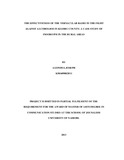| dc.description.abstract | This study explored the effectiveness of the programs aired by the Inooro FM which are geared towards fighting alcoholism in the rural areas of Ruiru in Kiambu County. The overall objective of this study was to find out the effectiveness of the vernacular radio in fighting alcoholism. The study had four specific objectives namely; to find out the anti-alcoholism programs aired by Inooro FM and to establish the roles that these programs play in the fight against alcoholism in the rural areas of Ruiru. The study also sought to assess the impact of the anti-alcoholism programs and to test their effectiveness in the fight against alcoholism among the youth of the rural areas of Ruiru.
Interviews were conducted using four focused group discussions (FGD) each consisting of eight participant and eighteen Key informant interviews drawn from Inooro FM presenters, experts from NACADA, village elders and alcoholic youth. The collected data were coded, analyzed in thematic groups and interpreted in relation to the research objectives. The findings were presented using verbatim quotes and narratives.
This study was guided by three theories of communication which were; agenda setting, two- step- flow and cognitive dissonance theories. However, these theories were not sufficient to give the relationship between anti-alcoholism campaigns and the consumption of alcohol by the youth from the rural areas of Ruiru. Therefore, a participatory conceptual frame work was developed for this study to address this gap.
This study found that Inooro FM has succeeded in raising awareness and creating new knowledge among the youth on dangers of alcoholism. However, it has not succeeded in stopping the youth from consuming alcohol. It was also found that the anti-alcoholism campaigns have succeeded in helping the alcoholic youth to seek help from NACADA.
This study concluded that the in effectiveness of anti-alcoholism programs was brought on by the failure to include the locals in all stages of developing these programs. Thus, this study recommends that media should involve youth in all stages of developing the anti-alcoholism programs. The study also recommends that the stereotype messages which make people perceive Kiambu County as an alcoholism zone should be stopped. | en_US |

